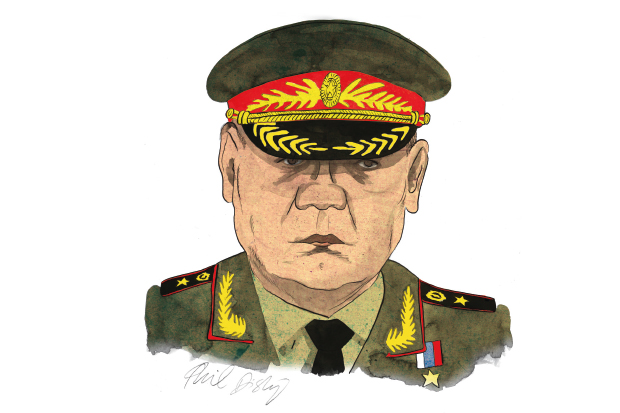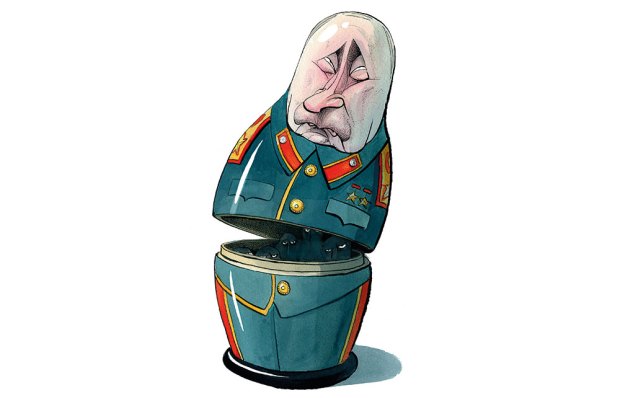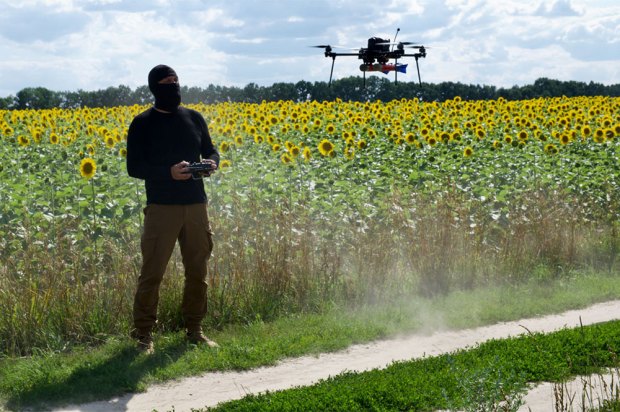‘Crimea is ours,’ President Putin boasted last May. He was speaking on a documentary viewed by millions of Russians, and it was the culminating moment in the militarisation of Russia. Moscow had attracted criticism for spending unprecedented sums on its armed forces under Putin, despite a weak economy over-dependent on oil. The successful annexation of Crimea seemed a perfect vindication.
Yet the huge expansion of Russia’s armed forces budget was instigated not by Putin but by the defence minister, the mysterious Sergey Shoigu.
The ascendancy of the military has propelled Shoigu up the ranks of the power elite to the extent that he is now regarded as the favourite to succeed Putin. And he has become a pivotal global figure after Turkey’s shooting down of a Russian warplane last week, which the Kremlin described as ‘planned provocation’. Shoigu is overseeing the investigation into the communications box of the aircraft, which will reveal if any warnings were delivered by the Turks in advance. And it was Shoigu who authorised Russia’s response: the deployment of S-400 missiles to the Russian air base in Latakia on the Syrian coast. As tension escalates, and Cameron and Obama dither, Shoigu has emerged as a key decision-maker.
He prefers to operate in the shadows, one step behind Putin and looking over his shoulder. His style is decisive but low-key. There have been no self-promoting TV interviews. Instead he prefers his spokes-man Igor Konashenkov to defend Russia’s Syria policy. When asked about the true targets of the air strikes, Konashenkov replied rather unconvincingly that the decision to bomb Syria was made at the last minute and executed within hours of the Russian parliament approving the use of force. In fact, Shoigu had been planning the military operation over several months.
As the brutal Russian pounding of rebel position in Syria intensifies, Shoigu remains a hardliner in Putin’s inner circle. During their meetings he told Putin that he had ‘no choice’ but to support President Assad. It was also, he said, an ideal opportunity to reinforce Russia’s last remaining ally in the Middle East. And there was the strategic benefit of shifting the debate away from Ukraine, which could lead to the easing of sanctions.
So who is this secretive, workaholic man overseeing Russia’s most aggressive foreign policy since the Cold War?
Sergi Shoigu was born in 1955 in Tuva, near Siberia’s Altai Mountains. After graduating from the Krasnoyarsk Institute, he became a construction engineer. He had some success, but showed no sign of entering politics. His opportunity came soon after the Chernobyl nuclear disaster. At a time when Russia was ill-equipped to handle such catastrophes, Shoigu became chief of the Rescue Corps and then minister of civil defence and disaster management. During this period, he enhanced his reputation by personally attending every fire, flood and explosion. He ensured his ministry was sensitive to the families of the victims.
Shoigu became popular as someone involved in rescuing people rather than delivering soundbites. As a result, he built a power base of former military and intelligence officers and Kremlin insiders who realised that he was popular with ordinary Russian people and wanted to bask in his reflected glory.
He became an important ally to President Yeltsin. Then, in 1999, Shoigu again benefited — albeit unwittingly — from disaster. A series of deadly explosions in apartment blocks in Moscow resulted in the soon-to-be President Putin and Shoigu developing a close bond. It was always Shoigu who appeared first on the scene and at the flashpoints and he was awarded his country’s highest award (Hero of Russia) ‘for courage and heroism in the line of duty in extreme situations’. He remained minister for emergency situations during the Putin years.
Politically, Shoigu is not ideological; heregards himself as a man of action and a traditionalist. Like Putin, he looks back with a fond if rather misty-eyed nostalgia for the Soviet era when the nation was a ‘great power’ and Russians felt safe and financially secure. Shoigu hated the corrupt oligarchs and despised the liberal reforms of President Gorbachev. His critics say that he suffers from a selective memory. ‘There was just as much corruption in Russia before the oligarchs and since Putin came to power,’ one analyst told me. ‘It was just structured in a different way.’
In 2012, Shoigu was made minister of defence and became integral to Putin’s strategy of restoring Russia’s military prowess as a way of winning elections. He focused on a massive overhaul of all the nation’s outdated military hardware and aims to modernise 70 per cent of Russia’s entire armed forces by 2020. By last year the defence budget was up to 4.8 per cent of the country’s GDP. Serious concerns have been raised about spending so much in a time of slow economic growth, falling oil prices, rising inflation and western sanctions. But Putin and Shoigu defend their policy as a way of boosting Russia’s hi-tech industry.
Putin has also used conscription to revive the martial spirit in Russian society, alongside the reintroduction of military training in schools. But Shoigu believes that a modern army requires professionals and prefers contract soldiers. ‘An unoccupied soldier is a threat to the police,’ he once said.
Putin and Shoigu are both throwbacks to Soviet times. They regard themselves as ‘Muzhiks’ (real Russian men) who love sports and hunting. Shoigu rides horses, plays ice hockey and shoots and hunts for elk, roe and bear throughout his beloved Siberia. He has a vast collection of Samurai swords, sabres and knives. Perhaps more surprisingly, he paints with oils and makes wooden artefacts at his country house in the outskirts of Moscow.
Over the past three years Shoigu has become a confident, ruthless and demanding defence minister. But it is his close friendship with Putin that will determine whether he becomes the next president. As the world regards their often-indiscriminate bombing of Syria with increasing hostility and trepidation, that personal bond will be severely tested.
Got something to add? Join the discussion and comment below.
Get 10 issues for just $10
Subscribe to The Spectator Australia today for the next 10 magazine issues, plus full online access, for just $10.
You might disagree with half of it, but you’ll enjoy reading all of it. Try your first month for free, then just $2 a week for the remainder of your first year.














Comments
Don't miss out
Join the conversation with other Spectator Australia readers. Subscribe to leave a comment.
SUBSCRIBEAlready a subscriber? Log in